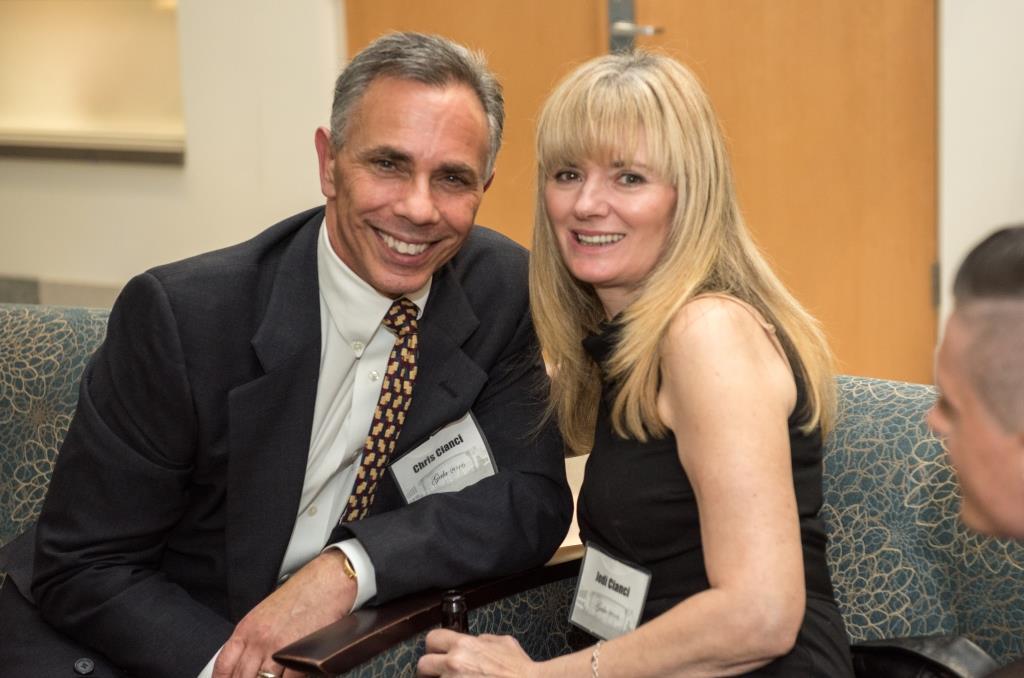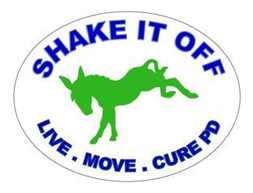A Little Bit About Us
Mission Statement
Advancing awareness, funding research, and promoting a higher quality of life for those living with Parkinson's disease through exercise therapies.
Co-Founders of Shake It Off
Shake It Off, Inc., was formed in 2012 as a charitable 501(c)3 Pennsylvania non-profit. Shake It Off was co-founded by Christopher Cianci, D.C., after his wife, a Delaware attorney, Jodi, was diagnosed with Young Onset Parkinson's disease. They were told by one doctor that she could either do 'nothing' or take 'the traditional P.D. meds' (like Levodopa/Carbidopa), but for this athletic couple, these were not options. They started a journey to find out how they could fight back. The couple visited Dr. Jay Alberts at the Cleveland Clinic in Ohio, where he conducted research on biking, the brain, and Parkinson's. Evidence showed a 35% reduction in symptoms of those with P.D. by the simple act of pedaling a bicycle at 80-90 RPMs for 45 minutes three times a week. Further, new research shows it may even slow the progression. Continue reading to learn more about Shake It Off.
Jodi has been doing a version of Dr. Albert's program by taking spinning classes three times a week, along with a personal trainer, and the results thus far have been remarkable. After only six weeks of cycling, Chris was the first to notice an improvement in her fine motor skills. She was able to use her right hand, and her once small handwriting looked almost as legible as it did 15 years prior to her diagnosis. Jodi continues her exercise therapies by incorporating HIIT (High-Intensity Interval Training) and advocates exercise for those with Parkinson's. As of 2024, she is still not on "the traditional P.D. meds!"
We host special events to raise funds to help advance exercise science as it pertains to those living with Parkinson's. Net proceeds have gone toward investigative research studies that involve exercise-related therapies for Parkinson's patients, advancing Parkinson's patients' quality of life through exercise strategies, as well as finding a cure. To date, we have funded research at the University of Delaware. (Read more at Dr. Knight's leading studies into the role of the nervous system in fast movement for Parkinson's patients.) We have also funded research at the Cleveland Clinic, Dr. Jay Alberts, the Brian Grant Foundation, the Davis Phinney Foundation, and the Michael J. Fox Foundation.
We are operated solely by volunteers. We are forever grateful for our volunteers. It takes a village to shake off Parkinson's.
Meet some of our past and current distinguished Board of Directors who have dedicated their time and talents to help us fight this neurological bully.
We thank you for your time and talents.
Co-Founders: Jodi & Christopher Cianci
Sumon Argwala, MD
Ian Connor Bifferato, Esq.
Christopher G. Cianci, DC
Jodi Cianci, Esq
Amy Colcher, MD
Christina Deaver
Jennifer Dolnycky, PT
Thomas Gangemi, PT
Stephen Gollomp, MD
Matthew Grajewski
Gary Hughes, CPA
Cindy Rendell
Curt Slater
Jennifer Showers, Esq.
Jeffrey Tucker, MD

The Research That Started It All...
Exercise Rate Related to Improvements in Parkinson's Disease
November 26, 2012, CHICAGO - People with Parkinson's disease benefit from exercise programs on stationary bicycles, with the greatest effect on those who pedal faster, according to a study presented today at the annual meeting of the Radiological Society of North America (RSNA). Functional connectivity magnetic resonance imaging (fcMRI) data showed that faster pedaling led to greater connectivity in brain areas associated with motor ability. Parkinson's disease is a chronic, progressive disorder of the central nervous system. Early-stage symptoms like shaking and difficulty with walking may eventually progress to cognitive and behavioral problems such as dementia.
An estimated 7 to 10 million people worldwide live with Parkinson's disease, according to the Parkinson's Disease Foundation, with most cases occurring after the age of 50. As the disease progresses and the frequency of side effects increases, the therapeutic window begins to close. Deep brain stimulation is an effective therapy for late-stage Parkinson's disease but is an invasive and costly procedure. Exercise is thought to have beneficial effects on Parkinson's disease.
Jay L. Alberts, Ph.D., a neuroscientist at the Cleveland Clinic Lerner Research Institute in Cleveland, saw this firsthand in 2003 when he rode a tandem bicycle across Iowa with a Parkinson's disease patient to raise awareness of the disease.
The patient experienced improvements in her symptoms after the ride. "The finding was serendipitous," Dr. Alberts recalled. "I was pedaling faster than her, which forced her to pedal faster. She had improvements in her upper extremity function, so we started to look at the possible mechanism behind this improved function."As part of this inquiry, Dr. Alberts, researcher Chintan Shah, B.S., and their Cleveland Clinic colleagues recently used fcMRI to study the effect of exercise on 26 Parkinson's disease patients. "By measuring changes in blood oxygenation levels in the brain, fcMRI allows us to look at the functional connectivity between different brain regions," Shah said. The patients underwent bicycle exercise sessions three times a week for eight weeks. Some patients exercised at a voluntary level, and others underwent forced-rate exercise, pedaling at a speed above their voluntary rate. The researchers used a modified exercise bike to induce forced-rate activity. "We developed an algorithm to control a motor on the bike and used a controller to sense the patient's rate of exertion and adjust the motor based on their input," Dr. Alberts said. fcMRI was conducted before and after the eight weeks of exercise therapy and again as a follow-up four weeks later. The research team calculated brain activation and connectivity levels from the fcMRI results and correlated the data with the average pedaling rate. Results showed increases in task-related connectivity between the primary motor cortex and the posterior region of the brain's thalamus. Faster pedaling rate was the key factor related to these improvements, which were still evident at follow-up."The results show that forced-rate bicycle exercise is an effective, low-cost therapy for Parkinson's disease," Shah said. Dr. Alberts noted that while faster pedaling led to more significant results, not all Parkinson's patients need to do forced-rate exercise to see improvement."We're now looking at this phenomenon in patients with exercise bikes in their home," he said, "and other exercises like swimming and rowing on tandem machines may provide similar benefits." Source: Radiological Society of North America
The Shake It Off Story

A Lesson to Live by
How we got our name...it may not be what you think!
A parable is told of a farmer who owned an old mule. The mule fell into the farmer's well. The farmer heard the mule 'braying'. After carefully assessing the situation, the farmer sympathized with the mule but decided that neither the mule nor the well was worth the trouble of saving. Instead, he called his neighbors together and enlisted them to help haul dirt to bury the old mule in the well and put him out of his misery.
Initially, the old mule was hysterical! But as the farmer and his neighbors continued shoveling and the dirt hit the mule's back, the mule shook the dirt off. Suddenly, it dawned on the mule that every time a shovel load of dirt landed on his back, he should shake it off and step up on the dirt pile! This he did, blow after blow.
"Shake it off and step up...shake it off and step up!" the mule repeated to encourage himself. No matter how painful the blows or how distressing the situation seemed, the old mule fought "panic" and just kept right on SHAKING IT OFF AND STEPPING UP!
It wasn't long before the old mule, battered and exhausted, stepped triumphantly over the wall of that well! What seemed like a situation that would bury him actually blessed him, all because of the manner in which he handled his adversity.
Our Focus
If you or someone you care about has Parkinson's, you have come to the right place. Our goal is to help those with Parkinson's live better lives through exercise until the cure is found! Shake It Off, Inc. has devoted its energy to passionately advocating exercise for those with Parkinson's disease.

